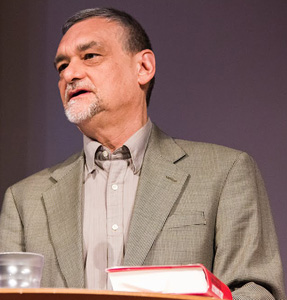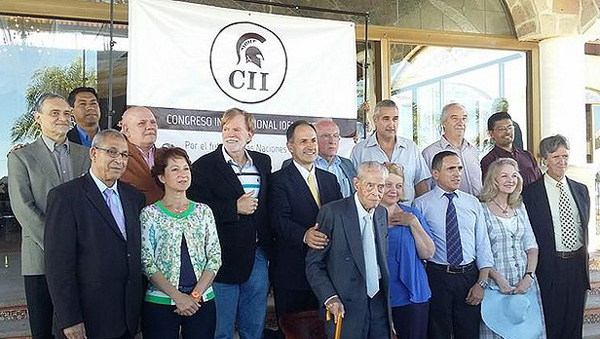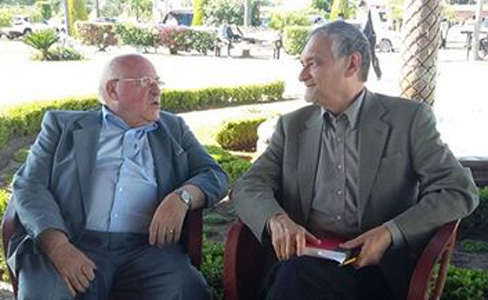Progress Report
Well-Received Talks at Activist Conferences In London, Stockholm and Guadalajara
More Meetings, Broadcast Interviews and Outreach
An Update From Mark Weber
Director, Institute for Historical Review
July 2015
During the past half year, we’ve been exceptionally busy and productive.
In April and May, I addressed important meetings of traditionalists, nationalists and “identitarians” in Britain, Sweden and Mexico. During my visits to those countries, I also had many productive discussions with activists, writers and publishers.
My address at the April 11 “London Forum” meeting, held in an elegant meeting room of the city’s first-class Grosvenor Hotel, was titled “The Danger and Challenge of Jewish-Zionist Power.” (A video of this talk is posted online. The text of the talk, as well as an audio recording of it are posted on the IHR website.)

Addressing the ‘London Forum’ meeting, April 11
This was my second presentation to this group. At a London Forum meeting last September, I spoke on “The Accelerating Crisis of the West, and Prospects for the Future.” (A video of that address is also posted online.
Jez Turner, the group’s capable and spirited organizer, hosted the April 11 meeting, which brought together more than 100 men and women — the best-attended London Forum event ever. Other speakers included: Prof. Kevin MacDonald, one of the most courageous and intellectually important scholars of our age; Pedro Varela, director of the “Librería Europa” bookstore of Barcelona, Spain; Gregory Johnson, American author and director of Counter-Currents Publishing; and, Paul Fromm, director of the Canadian Association for Free Expression.
Jewish-Zionist leaders angrily complained about the meeting, which received hostile media coverage in major British papers and by Jewish-Zionist news services. A leading Zionist group, the “Board of Deputies of British Jews,” protested because the police had concluded that none of the speakers had done or said anything illegal. The news that the meeting’s organizers “would go unpunished provoked outrage in the Jewish community,” the London Daily Express reported.
The most absurdly alarmist coverage was by the Mail on Sunday, whose report was headlined “Nazi Invasion of London EXPOSED: World’s Top Holocaust Deniers … at Secret Hate Rally …” This “sickening” event, the mass–circulation paper went on to tell readers, is “the most significant gathering of Holocaust deniers Britain has ever seen.”
In fact, not a single one of the talks at this meeting was about the “Holocaust.”
Moreover, both the Mail on Sunday and the “Israel National News” inaccurately attributed words to me that I never said or wrote.
I contacted the Mail on Sunday to protest its distorted reporting, and in particular its untrue statements about me. After returning to the US, I also arranged to meet with the paper’s southern California correspondent. During our conversation at a coffee shop, he proved to be arrogant and ignorant, but he did concede that his paper had inaccurately quoted me.
Eventually I persuaded the Mail on Sunday to issue a statement acknowledging that it had erroneously attributed to me a remark about the Holocaust that had actually been made by someone else. (For years the Zionist “Anti-Defamation League” has perpetrated this falsehood on its main website, attributing to me a quote from a 1989 issue of the IHR Newsletter that, in fact, was written by someone else. Such shoddy “research” is typical of this strident, self-serving group – which the mainstream media nonetheless treats with high regard.)
I also persuaded The Mail on Sunday to publicly acknowledge that another quote it had attributed to me from my April 11 address was actually by a Jewish writer whom I was citing.
From London I flew to Sweden, where I addressed a meeting in central Stockholm organized by the “Logik Förlag” publisher. I was impressed with the high level of awareness and spirit of the attendees, most of them serious, dedicated men in their 20s and 30s. The audience of more than 100 at this April 18 gathering included people who had traveled from Norway, Denmark, England, the Netherlands and Belgium.
In my address, titled “Looking Ahead in an Age of Darkness,” I spoke first about how the System that has prevailed in Europe since the end of the Second World War is rapidly losing popular trust and credibility, and is ever more clearly in crisis. This breakdown, I went on to explain, is inevitable because the governing postwar order is organized according to an ideology based on false premises about life, history and society. I concluded by stressing the importance of affirming what is true and doing what is right, motivated not by a “smart” calculation of “success,” but rather driven by a firm sense of duty. (A video of this address is posted online. The full text of the talk, as well as an audio recording of it, are posted on the IHR website.)

Speaking at the meeting in Stockholm, April 18
Other speakers at this event included Ricardo Duchesne, professor at the University of New Brunswick (Canada), as well as Kevin Macdonald, Gregory Johnson, and Jonas De Geer.
The largest of the three recent meetings I addressed was the “International Identitarian Congress,” May 1-3, in Guadalajara, Mexico. More than 200 men and women gathered at a spacious hacienda for presentations by speakers from Argentina, Spain, Germany, Italy, Britain, Mexico and the US.
I gave two well-received talks at this impressively organized gathering. The first, on the challenge of Jewish-Zionist power, was similar to my April 11 address in London. In my second address, I spoke about the ever more obvious breakdown of the System that governs in the US, Europe and the western world, and the encouraging expressions of “identitarian’ resistance, especially in Europe, to the forces of decay and cultural dissolution.
This conference was dedicated to the life and work of Salvador Borrego, an influential Mexican journalist and author who is one hundred years old. His most widely read book is Derrota Mundial (“World Defeat”), which has gone through more than 60 printings. In this detailed, inspiring work, Borrego portrays World War II as a victory of the forces of Marxism and cultural dissolution. In his remarks to the gathering, the centenarian Borrego praised the heroism and sacrifice of the millions of German soldiers who gave their lives in defense of the West and its heritage, and to secure a better future for Europe and the world.

The speakers at the ‘International Identitarian Congress’ in Mexico. In front, with light-colored tie, is the
hundred-year-old author Salvador Borrego.
Among the others who addressed the Guadalaljara conference were: E. Michael Jones, American author and editor-publisher of Culture Wars; Pedro Varela, Spanish author and publisher; Michelle Renouf, London-based film-maker, who addressed an IHR conference in 2004; and, Uwe Meenen, a leading figure of Germany’s National Democratic Party, and a close colleague of Udo Voigt, a member of the European parliament.
Abdallah Melaouhi, a Tunisia-born man who lives in Berlin, also spoke. He served as the medical attendant of Rudolf Hess during the final five years of his life as the lone prisoner in Berlin’s Spandau prison. Melaouhi spoke about his friendly relationship with Hess, the high-ranking Third Reich official and close colleague of Hitler who had risked death in a daring 1941 solo flight to Britain for peace, and who was unjustly sentenced to life imprisonment by the victorious Allied powers. Melaouhi also gave reasons to support his view that Hess did not commit suicide in 1987, as Allied authorities claimed, but was murdered.
Ernst Zündel, the German-born activist and publisher who endured seven years imprisonment in Canada and Germany for his dissident views, also addressed the conference. I was pleased to meet and talk at length with Ernst, whom I had not spoken with face- to-face since 2000 when he addressed an IHR gathering in California. With him was his wife, Ingrid Rimland, herself a noted author.

Ernst Zündel chats with Mark Weber during a break at the Guadalajara conference
In spite of his grim prison ordeal, he was as outgoing and as upbeat as ever. He is still — as he put it — “unbroken.” At this Guadalajara gathering, Zündel received at least some of the recognition he deserves for his courage and steadfastness as an unjustly imprisoned “thought criminal.”
He and I first met at the great “Holocaust trial” of 1988 in Toronto, where I testified on his behalf as a court-recognized expert witness on Germany’s wartime policy and the “final solution.” During the seven years that Zündel was behind bars, I devoted much time and effort to informing the public about his plight, and explaining why he and others have been fined, imprisoned and forced into exile for expressing dissident views about twentieth century history. I spoke out in countless interviews about his ordeal and its significance, helped organize street demonstrations to protest his imprisonment, and arranged public talks by other free speech activists who spoke about the Zündel case.
After his arrest in Tennessee in early 2003, he was deported to Canada where he was held for two years in solitary confinement as a supposed threat to “national security.” The injustice of the Canadian treatment of Zündel was so obvious that even the country’s most influential newspaper, the Toronto Globe and Mail, affirmed in an editorial that he posed no risk to people or property, and that he was being held unjustly on a bogus “guilt by association” pretext. In March 2005 he was deported to Germany, where – after a conviction for “thought crimes” — he was imprisoned for five years. Since his release in 2010 Zündel has been living at his family homestead in Germany’s Black Forest region.
Since January we’ve held two IHR meetings here in southern California.
In my address at the Feb. 28 IHR meeting, titled “Making Sense of America’s Wars and Foreign Policy,” I took a look at the record of US military intervention over the past century, and the dangerously false premises on which US foreign policy is based. Because American foreign policy is driven by the country’s guiding ideology, an “exceptionalist” egalitarian-individualist outlook that is not rooted in historical or social reality, pressing ahead with policies guided by this ideology will inevitably bring further suffering and disappointment, and will hasten America’s decline.
At our well-attended IHR meeting of June 6, I gave a detailed first-hand report on the recent conferences in London, Stockholm and Guadalajara. I spoke about my role in those gatherings, and my productive discussions with activists, writers and publishers, and I shared observations about life and trends in Britain, Sweden and Mexico.
As part of our continuing effort to broaden our outreach, I’ve conducted more interviews in recent months with US and overseas media, appearing many times as a guest on radio and television broadcasts to talk about topical and historical issues.
Our “IHR News and Comment” e-mail service continues to grow, steadily gaining new subscribers at a good pace. For eight years we’ve been compiling and distributing, several times each week, timely roundups of news, analysis and commentary items.
To make a secure on-line donation, click here.